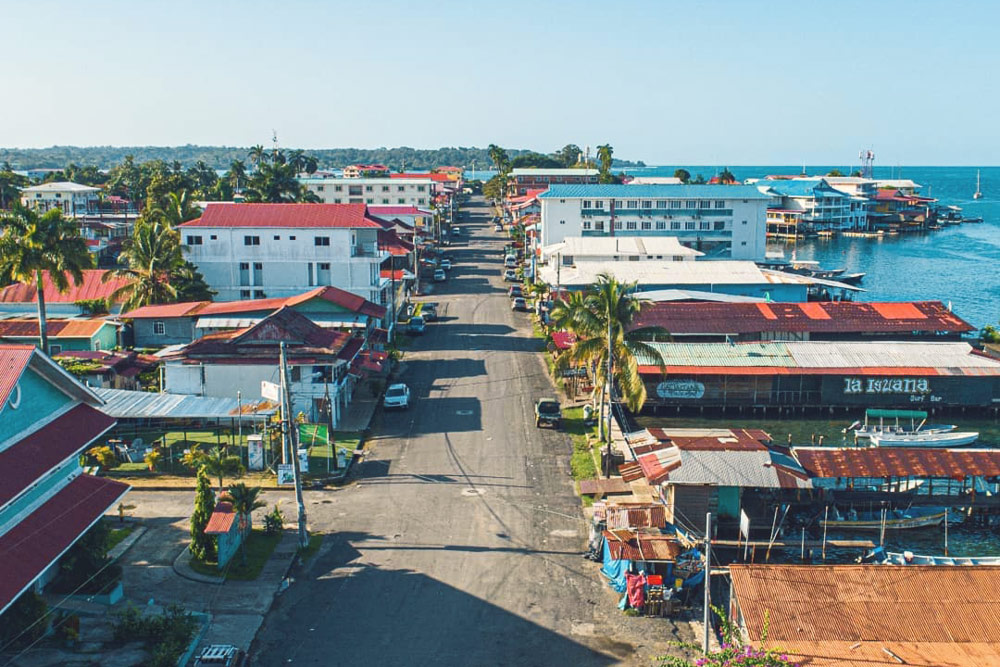How to Purchase Property in Panama
Buying real estate in Panama can be one of the best decisions/investments you’ll ever
make, but that doesn’t mean it’s a walk in the park. Panama, like any other country, has its own
unique policies, regulations, procedures, and practices when it comes to real estate
transactions. These intricacies can often times leave many feeling intimidated, insecure, and
doubtful, and in worst case scenarios, cause mishaps, complications, wasted time, and wasted
money. With this article, we hope to leave you substantially informed as to how to safely,
smoothly, and successfully acquire property in Panama, and enjoy all that this incredible tropical
country has to offer!
Types of Property
The first thing to be learned, is that there exist two types of property ownership in
Panama. Though both are legal manners of owning real estate, there are a number of
differences between the two, and each have their advantages and disadvantages. Let’s dive in!
Right of Possession: ROP property is very common throughout all provinces of
Panama, and is most prevalent along coastlines and on islands. ROP properties are a safe and
legal investment if you are well educated on the purchase process, including but not limited to
due diligence prior to purchase, legal purchase procedure, and post-purchase legal procedures
/ requirements. Unlike titled properties, ROP properties do not have unique ID numbers they’re
recognized by. Instead, ROP properties are handled at a Municipal level, and involve a variety
of paperwork/documentation which must be meticulously maintained by the owner as
record/proof of ownership (because we must play devils advocate and assume that the
Municipality might not properly maintain their records.) While ROP property may sound like a lot
of effort, it’s actually quite simple once understood, and even offers a few very interesting
advantages.
Other notable Characteristics include:
ROP property does NOT incur annual property taxes.
ROP property is taxed at a municipal level, at only 2%.
ROP property is more easily segregated, and the process is relatively quick if done properly.
ROP property cannot be used as a security/collateral to acquire bank loans within Panama.
ROP property is often significantly cheaper to purchase than titled property.
ROP property should be properly fenced, and maintained at all times.
ROP property if left vacant can pose risk to the owner, as ROP can be lost to another
individual/entity if said individual/entity occupies the property for a sufficient amount of time
without being removed.
Titled Property: Titled properties are plentiful throughout Panama, including on
coastlines and islands, and are often considered by many to be the “more secure” type of real
estate investment in the country. Though titled property purchases often require less due
diligence, it is still important to be well versed on the process of acquisition and transfer of
ownership to avoid delays, complications, or excess expenses. Unlike ROP properties, titled
properties are each given an identification number, often referred to as the “title number” or
“finca number” (among other names.) These IDs, along with documentation/information of the
property’s location, owner, and history (transfers of ownership, etc) are digitally registered with
the government on a national level, permanently maintained, and accessed on demand by
visiting the Public Registry, or the official website of the Public Registry. While this makes
ownership of titled property very safe and relatively effortless, there are a handful of other
characteristics of titled property which can be considered both advantages and disadvantages.
Other Notable Characteristics include:
- Titled property incurs an annual property tax, based upon the registered value of the property.
- Titled property incurs a 5% tax upon sale.
- Titled property often requires more time and expense for segregation (eg. Carving a plot out
of a larger plot, or separating one large parcel into 5 smaller parcels to be sold, etc) - Titled property can be used as a security/collateral to acquire bank loans within Panama.
- Titled property allows for easier procedures of development/construction, especially if
Environmental Impact Studies are required. - Leaving your titled property vacant, undeveloped, or unmaintained usually does not pose any
risk to your ownership rights. - Titled property is often more expensive to purchase than ROP, due to the value added by the
title.
Legal Counsel
One of the most important elements of purchasing property in Panama is legal
counsel/services, or in other words, the attorney(s) you use to assist you with completion of the
transaction. With a knowledgable, experienced, well chosen attorney or legal team, property
acquisition in Panama can be relatively simple, quick, and painless. With the wrong
attorney/legal team however, a process that should be simple can become very complicated,
resulting in excess delays, expenses, complications, or failure to complete the transaction.
Unfortunately, many attorneys within Panama will advertise themselves as being well
experienced in real estate transactions, but the truth is that only a portion actually are!
One benefit of utilizing a good real estate brokerage or quality independent realtor to
acquire your property, is access to the legal team of said brokerage/realtor, as any brokerage or
realtor worth their salt will have a legal team (or at least a primary attorney) that handles all of
their business. Access to experienced legal counsel in these scenarios can make all the
difference and even be the deciding factor between a failed transaction and a successful one.
Should you choose to acquire property independently of a realtor/brokerage, and source
your own legal counsel, it is recommended to utilize a firm or attorney which offers bilingual
services, maintains a physical office (ideally with staff/assistants), and can show you a
successful history of acquisitions and transactions of real estate. You will also want to clarify
what type of real estate this attorney/firm has dealt with in the past, as it can be a totally
different ballgame purchasing a ranch in the mountains, or a beachfront plot of land on an
island, as compared to purchasing a home or condo in one of Panama’s cities. Lastly, be sure to
receive an estimate (on paper or via email) in regards to your expected expenses for the
acquisition, and fees that will be charged by the firm/attorney. Forgetting to have this
conversation with your chosen firm/attorney is like letting the waitress of a 5 star restaurant
decide what to order for your table, when to close out your check, how much tip to add on, and
then giving her your credit card on a silver platter.
Financing Real Estate in Panamá
Financing real estate investments in Panamá as a foreigner is usually not in the cards
unless you have already been living in Panamá for a period of time and meet a variety of the
following: banking history within Panamá, residency, employment (or self employment) income,
along with a few other stipulations certain banks may require. For the majority of foreigners
looking to retire, invest, or for any reason buy real estate within the country of Panamá, the most
common scenarios involve paying cash for your purchase (in the form of a secure wire transfer
via an escrow account), acquiring a loan in your home country which may be used for purposes
abroad, or working out a form of financing directly with the seller.
Seller financing is quite common, and can involve a payment timeline as short as a few
months, up to a number of years (especially for larger purchases). Though working out an
agreement with the seller to finance your purchase over a period of time may sound attractive
and allow you to purchase sooner, or acquire a larger/more expensive property, it is very
important to remember that terms of seller-financing lean more in favor of the seller than the
buyer. If you agree to make a down payment of $50,000 USD and pay $10,000 a month for 6
months to acquire the property, it is not uncommon to be held to a clause which states if you are
unable to make any of these subsequent monthly payments you will forfeit the property
(defaulting) as well as a majority of the money you have paid towards thus property thus far, if
not all of it.
For this reason, it is very important to take your time when arranging seller financing for
your real estate investment in Panama, and ideally you want to be working with an experienced
real estate agent/brokerage to help you navigate these types of situations and arrange for you
the best possible terms and conditions, which have the least involved risk for you as the buyer.
Cash is truly king in Panamá. Remember, property prices here are often a fraction of
what you are used to paying in your home country, so the best possible scenario is one in which
you have saved up the funds necessary to offer the seller a cash purchase, involving a
downpayment and subsequent final payment all within relatively short time. Not only will this
limit risk to you as the buyer, but it will also work in your favor when making offers and
negotiating with sellers, for achieving the best possibles prices.
Purchase Procedure of ROP Property
If you find yourself falling in love with an ROP property in Panama, you can expect the
following steps to achieve a successful and secure acquisition.
- Plenty of due diligence. This includes but is not limited to verifying the surveys and ownership
certification documents of the property, and investigating the history of the property dating
back at least 10 years. You will want to get your feet on the ground, and confirm that the
property is as shown on the survey, and does not have any boundary issues, encroachments,
undisclosed easements, or unlawful occupancies. Ideally the property should be fenced so
there is no confusion as to where the property lines are. - If desired, due diligence can be taken one step further by visiting the Municipality, presenting
the seller’s documentation of ownership, and confirming that there are no claims or issues
with the property, and that the Municipality currently recognizes the seller as the rightful
owner. - If needed, have an updated survey performed, and an up to date ownership certification
acquired from the local municipality, which can be solicited by the property owner. - Testimonials by community residents, adjacent land owners, and family of the seller all
certifying the seller as the rightful owner of the property, and declaring to have no issues with
the sale of the property or property lines are completed prior to moving forward. - If due diligence finds that all necessary elements seem to be in order, and testimonial
declarations are complete, a Promise to Purchase (if planning to make a down payment, and
subsequent payment(s)) or Bill of Sale contract is drawn up by an attorney. - Expect to make your down payment the day the Promise to Purchase contract is signed, and
your final payment the day the Bill of Sale is signed. We recommend making any payments
via a certified bank check, and utilizing an escrow or intermediary account as opposed to
sending the money directly to the bank account of the seller. - Upon signature of Bill of Sale, or completion of final payment (if making multiple payments)
the seller must report to the Municipality that he/she has sold the property, and pay the
necessary taxes (2%). - The buyer must have a survey of the property printed out in the buyer’s (new owner) name.
- The buyer (or buyer’s attorney) now must visit the Municipality of the district in which the
property was purchased, and present the Bill of Sale contract, along with all other paperwork
and documentation including: Receipt of Payment signed by Seller, Certification of Ownership
of Seller, Receipt for Payment of 2% Municipal tax paid by seller, Original survey in name of
seller, and newly printed survey in name of buyer. - The Municipality will register the transaction as complete, and emit a new Certification of
Ownership in name of the buyer, which usually has a small fee attached to it anywhere
between $5-25 USD depending on the district. - All documentation and paperwork from the acquisition (including the new Certification of
Ownership provided by Municipality) must be scanned, and maintained both digitally as well
as physically in paper form. - Be sure to have the property properly fenced if it is not already, and if you will not immediately
be occupying the property yourself, be sure to find a local resident in the area to do the
caretaking on a regular basis (upkeep of fencing, cutting of grass, landscaping, etc) - Optional: Have a small structure such as a traditional “rancho” built on your property if you
do not plan to build or develop it in the near future. This lends to the legitimacy of your Right
of Possession of the property, showing that you are indeed occupying and utilizing the
property, even if not living there.
Purchase Procedure of Titled Property
If you have found your dream property, and it happens to be Titled, you can expect the
following steps to a successful and secure acquisition of the property.
- Due diligence with a titled property is a little more simple than ROP, but relatively similar. You
want to verify the survey and title of the property, which can be done by soliciting said
information from the owner, and investigating the property within the Public Registry using the
title or “finca” number (done by agent, brokerage, or attorney). This investigation via Public
Registry will show you the history of the property, whether the property has any liens, claims,
or bank loans attached to it as well as other information including the full name or company
name of the rightful owner. - Along with a positive report from the Public Registry investigation, you will want to get your
feet on the ground and verify that the property is as described, property lines are correct and
match the survey, and that there are no undisclosed easements, encroachments, or unlawful
occupancies. - If you plan to purchase the entire property, a Promise to Purchase or Bill of Sale contract can
be drawn up, and payment made in the same way as mentioned above when purchasing
ROP property. - If only a portion of the property is what you plan to purchase, a survey must be completed for
the parcel being sold, and the seller must solicit from the government entities a segregation of
this parcel you plan to buy. When segregation is complete (this can take up to a few months
or more) and your parcel is now recognized as its own independent property with its own title
or “finca” number, a Promise to Purchase or Bill of Sale contract can be drawn up and
payment made as mentioned above in the procedure of ROP acquisition. - Upon closing of the transaction (final payment made), your attorney will need to take all
documentation and paperwork of the acquisition to the Public Registry to have the transfer of
ownership officially registered. - Be sure to have a new survey printed out in your name as the new owner.
NOTE: If the titled property you plan to purchase has a bank loan attached to it, keep in mind
that prior to moving forward, the seller will need to acquire permission and documentation from
the bank permitting the sale, and immediately upon receiving payment will need to settle up with the bank, so that the lien against the property is dissolved, allowing for an unencumbered transfer of ownership.
Tropic Lands Real Estate
As you can see, the procedures for purchasing property in Panama can be quite
involved and if not performed properly, can lead to complications involving but not limited to loss
of time and/or money. As a licensed and reputable real estate brokerage in Panama, Tropic
Lands Real Estate specializes in handling all of these procedures for you, whether you are
purchasing ROP or Titled property. Our services include experienced and in-depth due
diligence, a very capable and experienced legal team to handle contracts, escrow account
provision (transfer your money from anywhere in the world with confidence), creation of
Panamanian companies and foundations, post-acquisition logistics, and even residency/visa
applications.
We have worked with clients from all over the world, and facilitated sales and purchases
of various types of properties including: island property, beachfront, mountain region property,
large ranches, plantations, homes, as well as hotels and other commercial property. Invest in
Panama with peace of mind, knowing you’re in the hands of an informed, experienced, and
professional brokerage.
Note: 10% of all commissions we receive are donated to our foundation Tierra Tropica, to be
utilized for environmental conservation & community improvement projects throughout the
country. Sleep well knowing your choice of real estate brokerage has directly and positively
impacted our beautiful country!
Further Recommendations
Hopefully this article has left you substantially informed and educated in regards to the
procedures and steps for purchasing real estate in the country of Panama. Aside from all of the
above mentioned, our final recommendations are that you take your time when deciding where,
when, and how to invest in property of beautiful Panama. Speak to informed and qualified
individuals, speak to expats who have already gone through the experience, and if possible get
to Panama and do some traveling throughout the various provinces to find out where your heart
and money belongs!
Though you might at some point come across a scenario and a property so seemingly
perfect that you are tempted to grab the nearest piece of paper (or napkin) and scribble down
what you think to be a sufficient contract of sale, max out your ATM withdrawal limit and give the
property owner a down payment……please don’t. Purchasing property in Panama can be one
of the best decisions you’ll ever make, and a relatively simple process, but when completed with
the proper knowledge, patience, and procedure. Take the extra time, and spend the extra
money to make sure your investment is made the right way, and into the right property!
Finally, have the courage to take the leap! Panama is a stunningly beautiful country with
a plethora of unique environments including remote villages, quaint beachside towns, luxurious
residential developments, big cities, and island archipelagos of fantasy. The country offers a
stable economy, democratic government, and impressive infrastructure, not to mention a long
list of incentives benefitting expats, investors, and business owners! If the dream of owning
property in a country where coconut palms are as plentiful as the beautiful beaches they grow
on, Panama could be just the right fit for you. If you want to learn more about real estate in
Panama, the country’s various regions/provinces, or current opportunities which may be right for
you we encourage you to visit our website, reach out to us directly via email, or schedule a
phone call.
Saludos from Panamá !
Dustin Conlon
Director & Founder
Tropic Lands Real Estate




